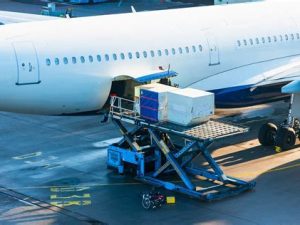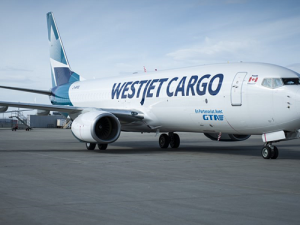Freight forwarders are taking a ‘wait and see’ approach before making long-term air cargo capacity commitments as airlines saw demand drop 2% month-over-month in November as general airfreight volumes dipped for a ninth consecutive month, dashing hopes of a late peak season boost, according to the latest weekly market by CLIVE Data Services, part of Xeneta. Chargeable weight in November was -8% versus the same month of 2021, although the 1% reduction in global air cargo capacity, as airlines adapted to winter schedules, contributed to a stable ‘dynamic load factor’ of 61%, on a par with the previous month, based on the volume and weight perspectives of cargo flown and capacity available. Load factor, however, continued to sit well below last year’s extraordinary peak season. For instance, Europe to North America load factor in the week leading up to the Thanksgiving holiday sat at 74% this year, down 12% from the same week last year. Amidst so much market uncertainty, industry parties are increasingly choosing shorter-term deals as they wait to see how business trends unfold in the coming months. Distribution of contract rates for shippers shows commitments of over three-month contracts hardly exist in Q4 this year.
Read More »$250 mn loan approved to improve India’s logistics sector
The Asian Development Bank (ADB) has approved a $250 million policy-based loan to support Indian government’s wide-ranging reforms that aim to improve and modernise the country’s logistics infrastructure, increase efficiency, and reduce the cost. The loan will fund the first sub-programme of the Strengthening Multimodal and Integrated Logistics Ecosystem Program, said an official press release. The sub-programme supports the government’s efforts to create a comprehensive policy, planning, and institutional framework at the federal, state, and city levels. This will rationalise India’s high cost of logistics and reduce greenhouse gas emission, the release added. To facilitate multimodal logistics, the sub-programme promotes reforms that reduce cumbersome processes that businesses face to obtain approvals for cargo clearance as well as the creation of digital systems that integrate regulations, processes, and logistics data. The programme promotes the facilitation of cargo movement through coastal shipping and inland waterways to strengthen multimodal transport. The programme also supports the ministry of commerce and industry’s initiatives to issue standards for warehousing, which would encourage operational efficiency and private sector investment.
Read More »QuikJet Airlines resumes flying with a B737-800BCF
Quikjet Airlines has successfully relaunched its own freighter flights with a leased B737-800(BCF) commencing revenue services in early December. The airline took delivery of VT-AAZ (formerly N120MN) (msn 30643) in August while reapplying for its air operator’s certificate after a change in its shareholder structure. The carrier (VT-AAZ) initiated revenue flights with a Hyderabad Int’l – Coimbatore – Hyderabad – Bangalore Int’l – Hyderabad rotation. FlightRadar24 ADS-B data shows the plane has flown a significant number of sectors within India since then, said official reports. The 20.74-year-old jet comes on a lease from Arena Aviation Capital via the MAM Aircraft Leasing 30643 (Ireland) DAC special purpose vehicle. Founded in 2007, QuikJet formerly operated an ATR72-200(F), B737-300(F), and B737-400(SF) but suspended in-house flying in 2017 when it retired its B737-400SF. At the time, QuikJet was majority owned by ASL Aviation Holdings but that group has since sold down its stake to minority status and now supply-chain mogul Cyrus Guzder owns 51% of the business.
Read More »Drone Pilot Flight to ferry pharma in Dehradun
Drones operators Skye Air Mobility and Redcliffe Labs have partnered to start a Long Term Drone Pilot Flight from the distant highlands of Uttarkashi to Sahastradhara, Dehradun, said reports. “The Redcliffe test samples are sent to the Dehradun Redcliffe Labs in 90 minutes through drone delivery from their collecting center in Uttarkashi. In order to deliver affordable and high-quality diagnostic services to the citizens of Uttarkashi, Redcliffe Labs will be flying daily flights for both routine and specialty test sample collection. Redcliffe Labs is the first diagnostic firm in India to use drones to carry samples, guaranteeing that individuals living in smaller towns or distant locations have access to high-quality, affordable diagnostics,” added reports. Ankit Kumar, CEO of Skye Air Mobility said, “The current form of logistics simply does not work for the healthcare industry in such a terrain geography. The need is to have a solution which is providing a faster, sustainable and scalable supply; drones rightly fit into elevating delivery, the Skye Air way. We are enthused to take our partnership with Redcliffe Labs to the next level of beginning long term flights helping the residents of Uttarkashi to get advantage from such services. Skye Air is working together towards a mission to impact lives at large and with our partners here, we are one step ahead in that journey.”
Read More »Cargo markets to face rise in pressure in 2023: IATA
Cargo markets are expected to come under increased pressure in 2023, said IATA’s latest report. Revenues are expected to be $149.4 billion, which is $52 billion less than 2022 but still $48.6 billion stronger than 2019. With economic uncertainty, cargo volumes are expected to decrease to 57.7 million tonnes, from a peak of 65.6 million tonnes in 2021. As belly capacity grows in line with the recovery in passenger markets, yields are expected to take a significant step back. IATA expects a fall of 22.6% in cargo yields, mostly in the latter part of the year when the impact of inflation-cooling measures are expected to bite. To put the yield decline in context, cargo yields grew by 52.5% in 2020, 24.2% in 2021 and 7.2% in 2022. Even the sizable and expected decline leaves cargo yields well-above pre-COVID levels, added report.
Read More »Continental Carriers honored at FICCI Annual MSME Summit
Continental Carriers Pvt. Ltd. has been awarded as the ‘Best Supplier/Service Provider for MSMEs’ at the FICCI-CMSME Annual MSME Summit 2022 and MSME Ecosystem Awards at FICCI – Federation House, New Delhi held on 5th December, 2022. Vipin Vohra, Chairman, Continental Carriers received the prestigious award from Shri Bhanu Pratap Singh Verma, Minister of State for MSME, Ministry of Micro, Small and Medium Enterprises, Government of India and Shri BB Swain, Secretary, Ministry of Micro, Small and Medium Enterprises, Govt of India. FICCI-CMSME, the MSME arm of FICCI sincerely understands the importance of the growth trajectory of MSMEs towards their sustainable development and keeping this in view, FICCI- CMSME had organized the Annual MSME Summit 2022 on the theme “Pushing Sustainable MSME Growth in India” with an objective to disseminate education in terms of policy reforms, supply chain enhancement and access to finance to reduce the information gap in this area for translating the potential into reality.
Read More »WestJet Cargo to launch 4 Boeing 737-800Fs in March ’23
WestJet Cargo, the air cargo division of WestJet confirmed the launch of 4 dedicated Boeing 737-800 freighters on March 26, 2023 to massively increase its operations, thereby meeting the growing demand of the Canadian market, said official reports. Kirsten De Bruijn, WestJet Executive Vice President of Cargo, said, “WestJet Cargo is about to enter a very promising and exciting period in its development. The arrival of our new fleet, converted freighters, will enable us to meet the rising demand of the Canadian market, more than ever before. 2023 will undoubtedly be a significant year for WestJet Cargo. Further announcements about the forthcoming launch will be issued very soon.”
Read More »New airside pharma facility to enhance global ops
Kuehne+Nagel (K+N) has struck a long-term agreement for a new airside facility at Johannesburg’s OR Tambo International Airport that aims to boost Africa’s healthcare and pharmaceutical logistics capability. As part of this agreement, K+N will offer customers a set of logistics solutions, including warehousing, transportation, customs brokerage, supply chain management, and airside support to project-specific charters for both in and outbound shipments. Core to this offering is a cold chain solution that ensures 24/7 temperature-control to safeguard the integrity of highly sensitive pharma products. The new offering has been designed to support Africa’s aim to become more self-reliant in healthcare operations. South Africa, Nigeria, and Algeria are leading the manufacturing charge in sub-Saharan Africa, while imports from Europe, North America, India and China remain crucial to meeting Africa’s demand for medicines and basic healthcare. “Pharmaceuticals in particular are highly-sensitive, time-critical products,” said Gereon Niemeier, managing director, Kuehne+Nagel South Africa. “Every minute these products spend on the tarmac exposes them to temperature fluctuations, physical damage, and loss. Our new facility addresses all these challenges to ensure product stability throughout the journey.” He added, “Our people have the expertise for plane-side access that other logistics providers don’t. “In addition, the facility is so close to the charter parking area that we can provide in-person visibility resources, as well as a unique dollie solution, that greatly reduce the risk of ground handling errors as well as shipment claims. “Onsite monitoring protects product stability – whether temperature-controlled, high value or time critical – throughout the entire journey.
Read More »Indian aviation, cargo seeing much stronger recovery:IATA
The global airline industry is projected to post a lower loss of USD 6.9 billion this year and eke out a “small net profit” of USD 6.9 billion in 2022, helped by higher passenger revenues and cost control by carriers, industry body IATA said, adding that India is seeing a “much stronger recovery” than the Asia Pacific region in general and the challenge will be in getting new aircraft as well as spare parts. After being hit by the pandemic, India’s domestic air traffic is recovering well and airlines are looking to expand their operations on local and international routes. In its latest update on the global airline industry, IATA said the Asia Pacific region is critically held back by the impact of China’s zero COVID policies on travel. On Tuesday, IATA said the global airline industry is expected to return to profitability in 2023 and post a small net profit of USD 4.7 billion. In 2022, airline net loss is expected to be USD 6.9 billion. This is significantly better than the loss of USD 42 billion and USD 137.7 billion in 2021 and 2020, respectively, it said.
Read More »Riyadh Airport to become cargo & logistics hub by 2050
Saudi Arabia has announced plans to transform Riyadh Airport into a six-runway airport and logistics hub that will have capacity to handle 3.5m tons of cargo by 2050. The site will include King Salman International Airport and will cover an area of approximately 57 sq km. It will also include 12 sq km of airport support facilities, residential and recreational facilities, retail outlets, and other logistics real estate, said official release. The development aims to boost Riyadh’s position as a global logistics hub, stimulate transport, trade and tourism, and act as a bridge linking the east with the west. The project is in line with Saudi Arabia’s vision to transform Riyadh to be among the top ten city economies in the world and to support the growth of the city’s population to 15–20m people by 2030.
Read More » Cargo Breaking News
Cargo Breaking News









